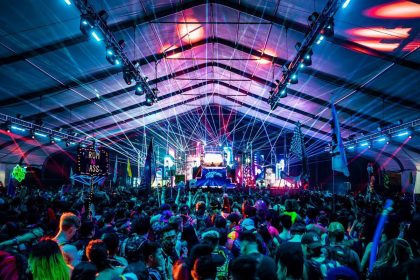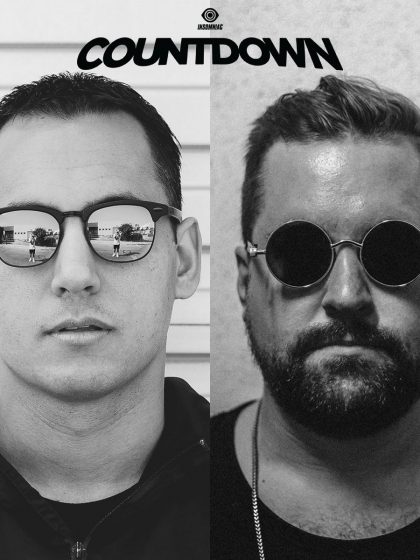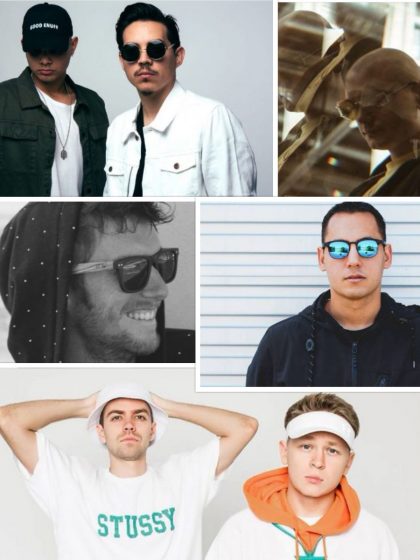Step Into the Weird and Wonderful Bass World of Zeke Beats
Let’s be perfectly honest: These days, the term “DJ” is used loosely, at least when looked at through the lens of someone like Zeke Beats, who holds titles as Australian Vice DMC Champ and IDM DJ Champ. He cut his teeth chopping, cutting and scratching alongside the likes of the legendary QBert and, to this day, still counts on his trusty Technics 1200s as his weapon of choice. Even Craze, the man who has made it his mission to preserve DJ culture, has sung the praises of Zeke Beats, who is currently signed to Craze’s Slow Roast Records.

After conquering the world of turntablism, Zeke saw his DJ world quickly become no longer dominated by crate diggers, but producers instead. It was time for him to put all his knowledge into making his own tunes. What has since emerged is a string of dark and twisted sounds capitalizing on the weird and wonderful world of underground bass music, as epitomized in his Meltdown EP. As a DJ, he hasn’t given up on the craft that got him here in the first place; his sets feature insanely creative mixing and blends that would leave any push-play DJ shaking their head in amazement. The wider DJ world has a lot to learn from artists like Zeke Beats.
We caught up with Zeke Beats ahead of his Project Z performance this weekend to chat about his beginnings as a DJ in his hometown of Perth, Australia, also the home of Pendulum and Knife Party.
Your DJ/production school in Australia, Lab Six, has been open for a few years now. What inspired you to create the school?
I have always been passionate about DJing, and turntablism in particular, so I decided to follow my dreams and do something I am legitimately stoked to do. Before I started Lab Six with [my business partner] Luke, I was an electrician!
What was your education like as an up-and-coming DJ?
I started to learn how to DJ when I was 13 years old, from my music teacher, George Scicluna. He taught me basic beatmatching on turntables, and from there, I fell in love with it. I eventually saved up enough money to get my own setup and then just [went through] a ton of experimentation with trial and error from there on out.
Although remote, your hometown of Perth, Australia, has an incredible music scene. Do you think that has to do with its isolation?
Perth is absolutely insane with its bass music scene. I think this is due to the fact that the promoters out there are always putting on quality shows, and it encourages the punters to get right behind them. There is also a really big up-and-comer DJ/producer scene out there, too!
Tell us about making the move from the turntablist world to the production world. Were you always making beats?
I never, ever thought about making beats until about five years ago, which is when I first started experimenting with my Maschine. The differences between DJing and producing are quite vast. I first made the switch to production after I had a studio session with EPROM. I felt so alienated to what I had been doing for so long with DJing. But after a few months of putting time into my production, and also getting tips and tricks from the almighty EPROM, I fell in love with it the exact same way I did with DJing and turntablism, and I still feel that way right now.
Do you think the electronic music community can do more to promote proper DJ culture to the masses?
I think it all comes down to the people actually understanding the basics of what is happening behind the decks, which I feel has happened more and more recently—especially when you can download DJ apps on iPads and iPhones these days. Although, this has also made it so easy for people to have a go at DJing, and in being so accessible, it has oversaturated the scene with DJs of much lower quality.
You are a DMC champ. The technology associated with DJing today is rapidly changing. Do you think that has helped or hindered DJ culture?
It’s done both. Having access to music instantly to vinyl using software is great—no more crates and crates of vinyl to gigs, [plus you save] a ton of money on buying records. The hindrances of all of this are that too many DJs are relying on the technology to do all the hard work for them, and they will never understand what it was like before this technology existed.
Any parting words?
I’m really excited for Project Z, and I can’t wait to hopefully blow some minds!
Catch Zeke Beats at Project Z Saturday, July 16.
Alexander Dias also makes sick beats. Follow him on Twitter.
Follow Zeke Beats on Facebook | Twitter
Follow Project Z on Facebook | Twitter | Instagram




![Zeke Beats Numbs Neurons With Screwy Number “Bounce” for Bassrush Records [Free Download]](https://d3vhc53cl8e8km.cloudfront.net/hello-staging/wp-content/uploads/2017/11/20070658/bassrush_2016_an_zeke_beats_release_bassrush_com_news_image_710x380_r01-420x420.jpg)
